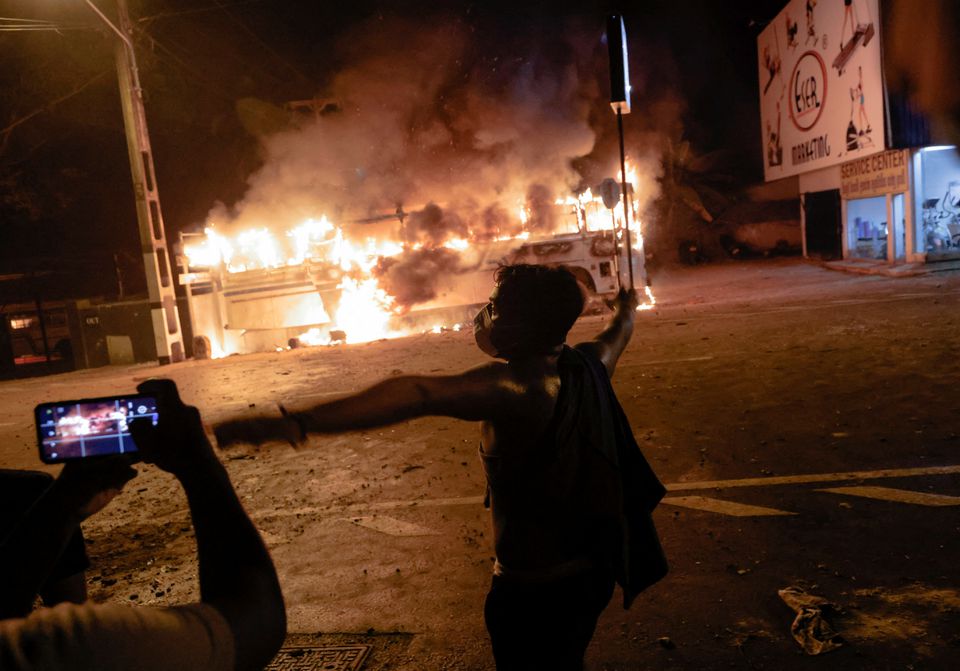The Sri Lankan crisis: Domestic and regional implications
7 min read
By Roshini Kapur
Sri Lanka is once again at the forefront of breaking news. The country is experiencing its worst economic crisis with basic commodities in severe shortages, 13-hour power cuts, and people queuing for hours to secure essential supplies. Many shops have stopped operations due to electricity shortages. It has become difficult for Sri Lankans to earn money or even get to work. The Gotabaya Rajapaksa administration responded to the increasing public unrest by declaring a state of Emergency, imposing restrictions on social media platforms—both have been lifted now—and a curfew.
The government no longer enjoys a parliamentary majority after 41 legislators exited the alliance. The mass defection of most members of the ruling coalition has left the government with a minority in the legislature, making it difficult for them to pass bills now. There are increasing calls for Gotabaya to step down and allow for an interim government to take over that would address the worsening economic crisis. Gotabaya recently dissolved the cabinet in a bid to form a unity government encompassing all parties in the legislature that the opposition has rejected. They claim that the government has lost its credibility by not handling the financial and economic crisis in a proper manner.
Gotabaya recently dissolved the cabinet in a bid to form a unity government encompassing all parties in the legislature that the opposition has rejected.
Anti-incumbency effect
The deteriorating economic crisis has affected Gotabaya’s fortunes with a drastic turnaround of support for the government who won a supermajority at the 2020 parliamentary elections, a rare move that has only happened once under the proportional representation system. The government enjoyed a “honeymoon” period during its initial months, where its strong national security agenda and initial response to COVID-19 resonated with the public.
However, some of its policies have worsened the economic situation in the country. In 2019, the government reduced taxes to help accelerate the economy. Murtaza Jafferjee, Chairman of the Advocata Institute, argued that the government provided a wrong solution to the problem by giving a fiscal stimulus through tax cuts. The massive tax cuts and economic mismanagement affected state revenue and prompted rating agencies to reduce Colombo’s credit rating to close to default levels resulting in the country losing access to overseas market. As a result, Colombo’s foreign exchange reserves plunged from US$ 6.9 billion in 2018 to US$ 2.2 billion in 2022. The depreciating foreign currency reserves impacted the government’s ability to import fuel and other essential commodities and was compelled to implement massive power cuts to deal with the crisis that increased prices and inflation.
Although the government has now turned to the International Monetary Fund (IMF) for a possible bailout, it resisted calls from the Opposition to engage the international institution earlier. Instead, it opted for bilateral engagements with regional powers, including India and China, in the form of currency swaps, loans, and relief packages. Harsha de Silva, a member of the main Opposition, Samagi Jana Balavegaya (SJB), said that the foreign debt is not sustainable and the government’s policies including the tax cuts and wholesale ban on chemical fertilisers have worsened the economic situation.
The massive tax cuts and economic mismanagement affected state revenue and prompted rating agencies to reduce Colombo’s credit rating to close to default levels resulting in the country losing access to overseas market.
The public is now somewhat willing to work with the Opposition who they ousted slightly over two years ago. Anti-incumbency was at an all-time high when Sirisena’s government lost the 2019 Presidential Elections. The previous Sirisena-Wickremesinghe administration mismanaged the economy, undermined national security, and the overall political climate. The former government was heavily criticised for not preventing or minimising the impact of the Easter Sunday terrorist attack in 2019. The country was also embroiled in a constitutional and political crisis when former President Maithripala Sirisena dismissed former Prime Minister Ranil Wickremesinghe, suspended the Parliament, and called for snap elections in 2018.
Domestic and regional implications
There is a consensus that the government does not understand the gravity of the situation and has been implementing policies without proper consultation from the relevant stakeholders. There is much uncertainty on what will happen next on the economic and political fronts. While imposing a state of Emergency, social media curbs, curfew, and arrests may temporarily stop the public from expressing their frustration, it will further aggravate them in the long term. The hashtag #GoHomeGota, in reference to Gotabaya, has transcended borders and prompted Sri Lankan diaspora in other cities to join their local counterparts in anti-government demonstrations.
The electoral system has provided the space for new political actors, parties, and coalitions to enter, form alliances, and contest elections. A realignment may take place between some former members of the ruling alliance including Sirisena and sections of the SJB who want an interim government to take over to address the urgent needs of the population before heading for snap elections. Unlike some democracies where members are ideologically aligned to a party, it is a common trait for politicians in Sri Lanka to defect from one party and join another for their mileage.
The Opposition and independent legislators could introduce a vote of no confidence against the President, call for early dissolution of the Parliament, and hold of snap elections. Gotabaya is adamant to hold onto power despite public pressure and en masse resignation of his cabinet. In efforts to regain some lost credibility, he has appointed a team of local economists to provide guidance on dealing with the current crisis and engaging external lenders.
The dire economic conditions may compel struggling families to escape the food shortages and increasing poverty by seeking refuge in neighbouring countries. Several boats carrying Sri Lankans have already reached India in search of better economic opportunities.
However, there isn’t a precedence for interim governments or the military to take over when the current administration is incapable to run the country. The only exception was in 2001, when the government, under the leadership of Chandrika Kumaratunga, forged an alliance with the Janatha Vimukthi Peramuna (JVP)’s and accepted its demands for a probationary government for up to a year. Moreover, an interim government with any member of the Rajapaksa family would not be an ideal situation to pacify the public. It will be difficult for Gotabaya to complete his term amidst the anti-incumbency and highly volatile environment in the country. If the Opposition returns to power, they may repeal the 20th Amendment to restrict the powers of the Executive President and relegate them to the other institutions. They will seek to implement a system with greater checks and balances and ensure that decision-making is not centralised in the executive branch. The Opposition will be under much public scrutiny to ease their economic plight that is worsening each week. The dire economic conditions may compel struggling families to escape the food shortages and increasing poverty by seeking refuge in neighbouring countries. Several boats carrying Sri Lankans have already reached India in search of better economic opportunities. Intelligence officers in Tamil Nadu have also received information that more refugees are likely to arrive in the coming weeks.
It will be challenging for the Opposition, if voted, to stabilise the economy in one term. The country’s financial issues have been years in the making due to economic mismanagement, accrued borrowing, and ill-advised tax cuts by successive governments. Moreover, the new alignment involving different parties of varying ideologies and political objectives will not be an easy one. They may not see eye-to-eye on key issues of foreign debt, development strategy, foreign policy, and geopolitics. While some members may want greater engagement with international institutions such as IMF, others would prefer aligning with a regional power.
The country’s financial issues have been years in the making due to economic mismanagement, accrued borrowing, and ill-advised tax cuts by successive governments.
Sri Lankans will not be afraid to oust the Opposition if it does not deliver its promises. After all, it is not uncommon for the current administration to face anti-incumbency mid-way or towards the end of its term. The public has used elections to remove incompetent leaders and replace them with new or former leaders, who also end up being incapable of running the country. Despite the volatility, their confidence in the electoral system has been resolute and unwavering all these decades.
On a regional front, the economic crisis in Colombo is presenting an opportunity for New Delhi to restore its traditional influence in the country as part of its “Neighbourhood First” policy and soft power diplomacy. It will also help India to push back against Beijing’s increasing clout in the region. New Delhi may try to project itself as a reliable and benevolent partner by providing further supplies of essential goods, grant assistance, currency swaps, and lines of credit in the immediate future. In the long term, it may focus on capacity-building, infrastructure development, humanitarian assistance, and financial management.
(Roshni Kapur is an independent researcher based in Singapore specialising in geopolitics, conflict resolution, identity politics and energy transition in South Asia. She previously worked as a Research Analyst at the Institute of South Asian Studies, National University of Singapore. She is the editor of the book ‘Sustainable Energy Transition in South Asia: Challenges and Opportunities’.)
